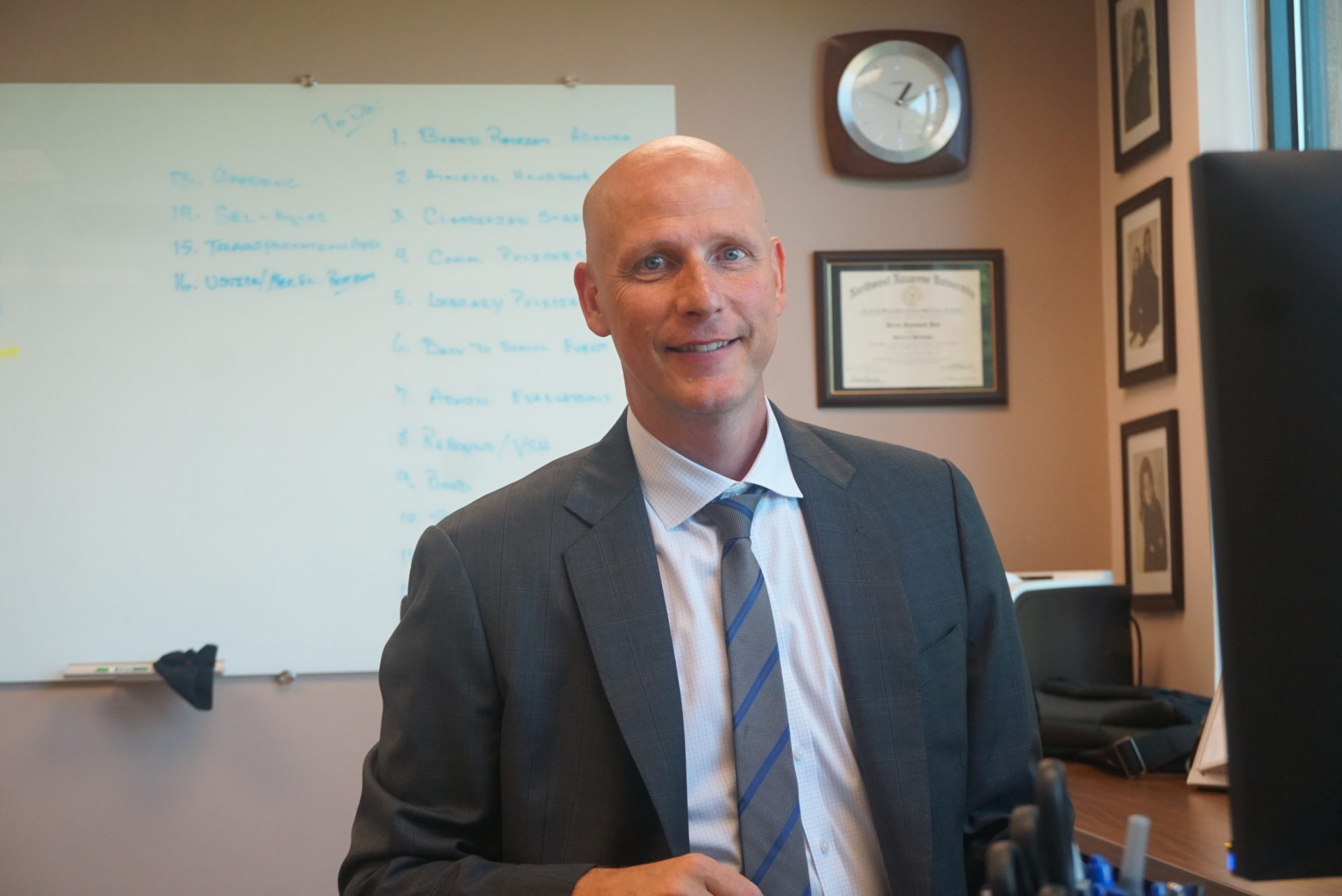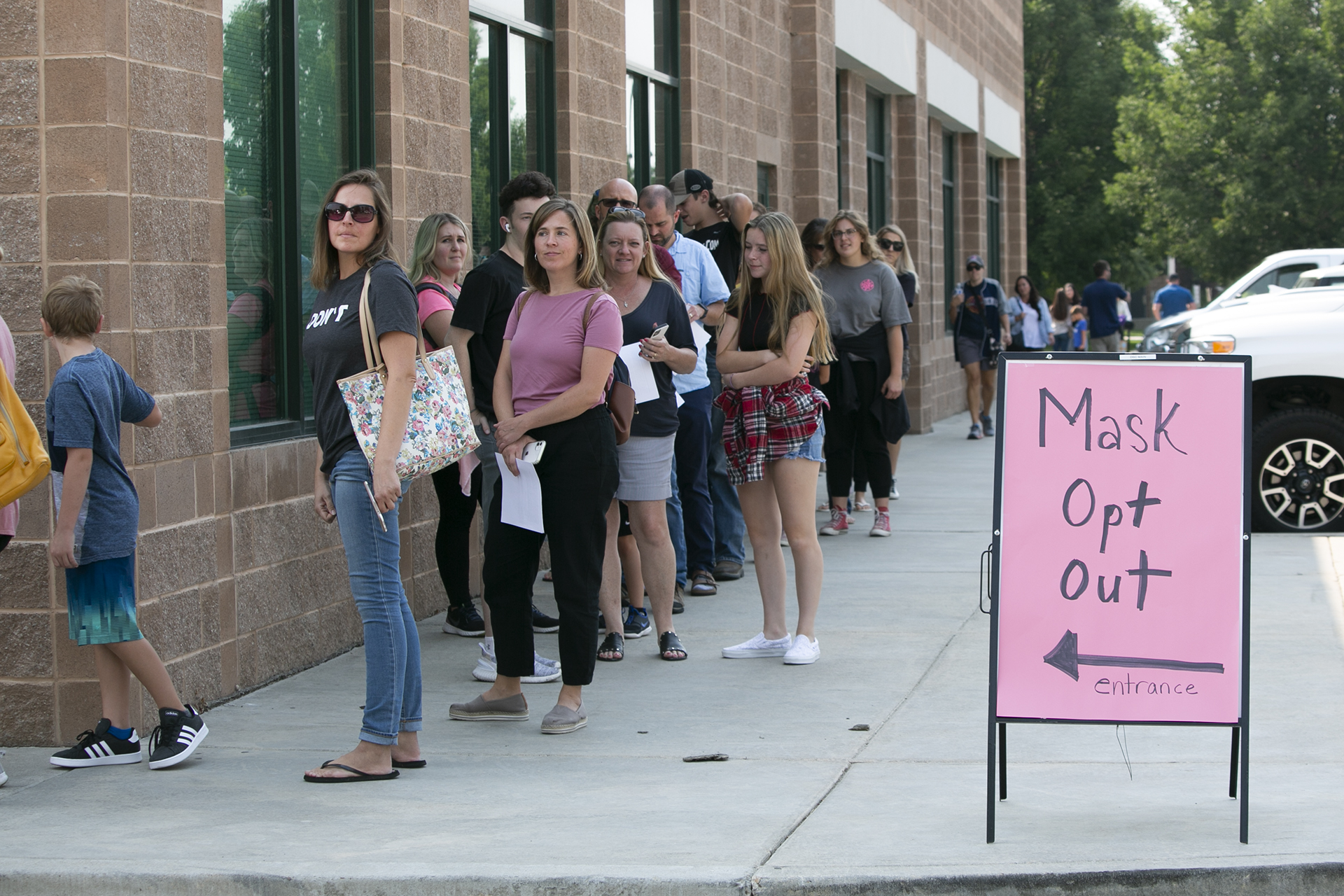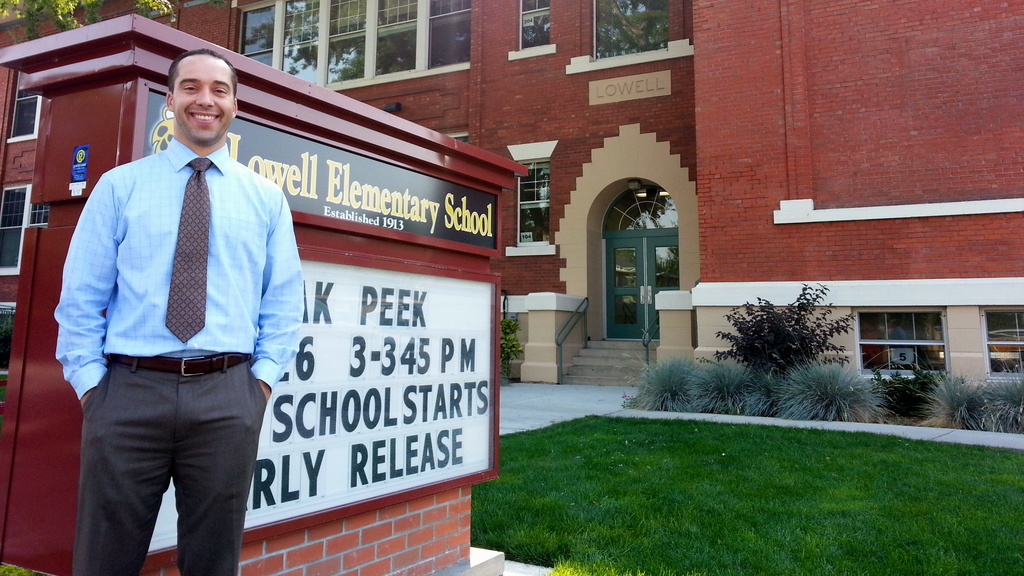
Derek Bub took over as superintendent of the state’s largest school district amid a global pandemic and rampant turnover on the school board.
Debates over mask mandates and claims that educators indoctrinate kids were at a boiling point.
It was tumultuous time, Bub recently acknowledged in his office at the West Ada School District. But issues surrounding his hiring exposed “cracks” in the K-12 foundation — problems that, for Bub, needed to be fleshed out in order to be fixed.
Bub has a phrase for it all: “productive struggle.” But it’s a process he can’t go at alone — a reality that’s shaped the former high school football coach’s approach to selecting his leadership team in West Ada.
For the last year, Bub has beefed up his administrative team, quietly assembling a staff of who’s-who leaders to make West Ada what Bub wants it to be: a poster child for excellence in public education in Idaho. Since taking over last year, the superintendent has recruited Gov. Brad Little’s former point person on education issues to head up district communications, enticed a well-known administrator with deep ties to state governance to be his deputy and convinced an attorney used widely by districts across Idaho to leave her private practice and work for him.
“West Ada needs to have a strong voice and a strong place in the state,” Bub said of the district, which enrolls some 40,000 students.
Trustees hired Bub at a shaky time
Bub admits underestimating COVID-19’s early impacts on K-12.
“We’ll be back in school by May 1,” he recalled telling his staff when he served as Centennial High School’s principal after the State Board of Education ordered schools to go remote through April 20, 2020, amid an early flareup of confirmed COVID-19 cases.
A year later, Bub was still grappling with the pandemic’s assault. But he wasn’t a principal. A freshly revised school board hired him in April 2021 to take over a district that had seen months of tumult.
A range of shakeups, starting in October 2020, preceded Bub’s hiring:
- Oct. 13: Trustee Ed Klopfenstein resigned as board chair but retained his normal seat on the board.
- Oct. 27: Board member Steve Smylie resigned after saying volunteer trustees are under enormous pressure because they were left to shoulder high-stakes school reopening and closing decisions.
- Nov. 17: Trustees appointed Sheena Buffi to replace Smylie.
- Dec. 8: Board chair Philip Neuhoff announced he will resign rather than face a recall election.
- Jan. 5: Bub’s predecessor, Mary Ann Ranells, announced her plan to resign, citing “personal reasons.”
- Jan. 21: Trustees appointed Rusty Coffelt to the fill the district’s Zone 4 vacancy. On Jan. 26, the board acknowledged complaints from patrons about the appointment process, but kept Coffelt as its newest trustee.
A range of other issues, sparked largely by a lingering pandemic, accompanied all the turnover. In October 2020, a group of parents had sued the West Ada Education Association, alleging a COVID-spurred teacher walkout, dubbed a “sickout,” was an illegal strike. The parents dropped the case weeks later, after the union’s president said in court filings that it did not intend to call for future strikes.
COVID-19 metrics began turning around in March 2021, three months before Bub officially stepped into his new role. But thorny issues bled into his tenure.
The Centers for Disease Control didn’t reverse its mask recommendations until July — after over 100 West Ada parents protesting the district’s mask mandate attended a May board meeting. Many left unhappy when trustees voted to keep masks mandatory for the final two weeks of school.
West Ada dropped its mandate on June 16, following a recommendation from Bub. But cases continued to climb among students statewide, further complicating the mask debacle.
The board voted in August 2021 to keep masks optional for kids, as long as parents or guardians completed an opt-out form. Hundreds of parents descended on the district to opt their students out.

And masks and a lingering pandemic weren’t the only hot-button issues surrounding Bub’s hiring. An education culture war had consumed the Statehouse in the spring of 2021, with some lawmakers blowing the horn on perceived indoctrination in Idaho’s schools, including outcry over critical race theory. In June, four days before Bub took over in West Ada, Lt. Gov. Janice McGeachin’s “Task Force to Examine Indoctrination in Idaho Education” targeted alleged instances of indoctrination in K-12 schools.
Find out how critical race theory turned into a political “bogeyman” for Idaho schools.
For West Ada, issues have trickled into 2022, with the Idaho Freedom Foundation blasting $125,000 the district earmarked for equity consultation, which the right-wing interest group claims promotes critical race theory.
All the outcry had at least some direct impact on the district. Earlier this month, trustees approved a policy restricting classroom decorations that critics say could foster indoctrination. The policy is aimed at ensuring that the district puts no “undue influence” on students, and preventing bias and accusations of bias in schools, West Ada spokesman Greg Wilson told EdNews after the vote.
Bub beefs up his team
For Bub, the flurry of education issues in recent years combined to underscore a big problem in K-12: a lack of trust between districts and their communities.

“There has to be trust,” Bub stressed, referencing his two daughters, ages 15 and 16, who attend West Ada schools. “I have to believe that they’ll get the best opportunity and that we’ll have a say in the way they’re raised in the education process.”
That boils down largely to listening and communication, he added. In April, the district made a big-name hire aimed at beefing up its communications and community outreach arm, bringing on Little’s former education adviser.
Bub introduced Wilson and his new role as chief communications officer at an April 24 board meeting, touting Wilson’s experience, including his time as senior education policy adviser to the governor. Wilson’s hiring came just months after he left the governor’s office for a private firm that received a $3.5 million no-bid contract from the state. More on that here.
Bub and Wilson met through a K-12 council Wilson helped convene with the State Board during his time in the governor’s office. The Omicron variant had fueled staffing issues in districts across the state. The council provided a connection between top state leaders and educators on the ground.
Wilson, who impressed Bub during the process, recently touted the need for districts — especially large ones like West Ada — to amplify what’s happening locally via a “communications infrastructure” already in place.
Part of that effort — a retooled district website with an accompanying mobile app to “increase communication with parents” — emerged this school year. The district is also ramping up messaging around student achievement. Bub and Wilson touted a series of YouTube “West Ada Ready” videos highlighting accomplishments from students across the district.
But Wilson’s statewide experience and perspective bring other advantages to the table — something another recent hire’s résumé accentuates even more.

Nick Smith, the Boise School District’s former human resource director, has joined West Ada as Bub’s deputy. Smith has ties to state education dating back to Marilyn Howard, Idaho’s two-term Democratic state superintendent who rose to political prominence in 1998.
Smith had been a teacher and administrator in the Bliss School District before joining Howard’s staff in 2006. He was former schools chief Tom Luna’s chief deputy, and supervised a variety of functions during his time at the SDE, from charter education and school nutrition to Title I and special education. He left the SDE for a principal’s post in Boise in 2013.
Another well-known face in state education circles rounds out Bub’s who’s-who team. Attorney Amy White, who has for years contracted for legal work with districts across the state, is now West Ada’s own general counsel.

That change stems not from lawsuits that districts attract from year to year — “which is what everyone always thinks,” said Bub — but from a mountain of policy items and contracts a district West Ada’s size produces.
White’s hiring ultimately boiled down to a matter of dollars and cents, said Wilson. Bringing her on was more “fiscally responsible” than paying her for so much contracted work.
Still, Bub’s high-level hires have come with notable price tags. Bub’s annual salary is the highest among Idaho superintendents, at $210,000. Smith last year made $147,000 for Boise, and Wilson joined West Ada with an annual salary of $117,700. EdNews will have a state tally of the latest administrative salaries, including White’s, in the coming days.
But, for Bub, the money’s worth it for an all-star cast.
“We don’t have a weak link,” he told EdNews.
So what now?
Bub stressed that top-level changes have happened with educational outcomes in mind.
Kids do better when they work well with teachers, he said. Teachers do better when they work well with administrators. Administrators do better when they work well with the school board. “It’s really about relationships.”
From a learning standpoint, Bub’s proud of some recent outcomes in the wake of two tough school years — but there’s plenty of room for improvement, as he sees it.
A plus: West Ada’s early reading scores followed an upward statewide trend last school year, growing a notable 17.2 percentage points in terms of student proficiency from fall to spring. The district’s overall fall proficiency rate raised eyebrows after landing at nearly 80% — almost 22 percentage points above the state average of 68.2%.
With Idaho’s largest sample size of students, West Ada’s scores are a closely watched achievement indicator in Idaho.
But Bub, a former high school math teacher and a self-proclaimed “math guy,” sees more room for improvement in the district’s math scores. On average, 53.4% of West Ada students performed proficiently on the math section of the 2021 Idaho Standards Achievement Test. (The SDE tells EdNews it will receive 2022 ISAT scores in the coming days.)
West Ada’s score is much better than the statewide average of just under 40%, but Bub and his team targeted math as a major area of improvement heading into the school year, funneling a portion of federal COVID-19 relief funds into two years worth of training opportunities for teachers, including a symposium that, he said, at least 100 teachers in the district have already participated in.
“It’s not about learning what six plus three is,” said Bub. “It’s about teaching kids how to solve problems.”
That includes elements in line with Bub’s own “productive struggle” philosophy: “Let the kids struggle a little bit,” he said of teaching math.
He reiterated the approach in his back-to-school address last week. This year’s district-wide theme: “Choose Challenge.”
